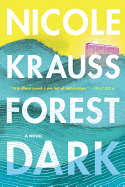
A National Book Award finalist and shortlisted for the Orange Prize, Nicole Krauss (The History of Love; Great House) sets Forest Dark largely in Tel Aviv, where her two protagonists are unsettled and transformed from their previous lives in New York City. Jules Epstein is an effervescent scholar in his 60s who methodically jettisoned his art collection, Upper West Side trappings and significant wealth to move into a slummy Tel Aviv apartment. From there, he mysteriously disappears, leaving his three children to sort out the details. Sandwiched into the third-person story of Epstein, first-person chapters tell of an unnamed mid-40s woman whose marriage is broken and new novel is stuck in neutral. She holes up in Tel Aviv's hulking seaside Hilton hotel and tries to bring her book back to life. A local scholar tracks her down to involve her in a project, filming a Kafka play and mining a surprising cache of Kafka's unpublished papers.
Neither Epstein nor the novelist meet, but both are on quests to understand their places in the contrasting worlds of New York and Israel, and in their Jewish families and history. Less interested in the dramatic, Krauss focuses on how her two protagonists intellectually and emotionally handle their respective pilgrimages. Along the way, Forest Dark dips into Freud, Descartes, Kafka and the Torah. If, as the Dante source of her title suggests, her protagonists have found themselves "in a forest dark,/ For the straightforward pathway had been lost," they acknowledge their fates and seek a rewarding alternative path. Krauss grapples with the questions more than the answers, and it is in this struggle that Forest Dark shines. --Bruce Jacobs, founding partner, Watermark Books & Cafe, Wichita, Kan.

